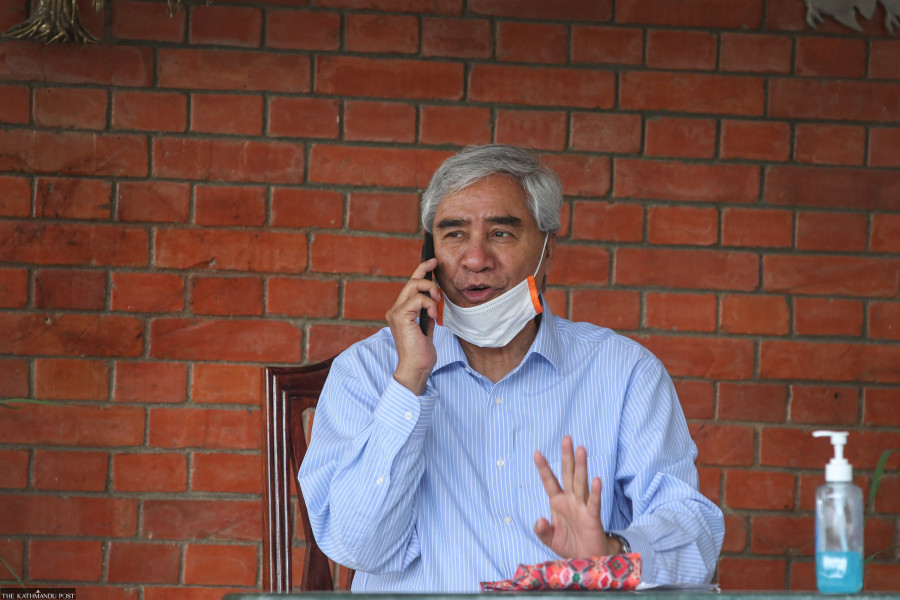National
Deuba recalls 12 envoys appointed by Oli
Twenty-three missions are now set to go headless, and some are in key countries—India, China, US, UK and Qatar.
Anil Giri
The Sher Bahadur Deuba government on Tuesday recalled ambassadors from 12 countries, who were appointed by the erstwhile KP Sharma Oli government under political quotas.
With the new decision, out of 33, Nepal’s 23 diplomatic missions abroad will remain vacant from the next three weeks to one month. As many as 11 missions have been headless for a long time.
“A Cabinet meeting today decided to recall the ambassadors appointed under political quotas by the Oli government,” said Minister for Law, Justice and Parliamentary Affairs Gyanendra Bahadur Karki. “Those appointed from among career diplomats will carry on their duties.”
The decision will mean Nepal will not have ambassadors in some key countries, with which it has a “very close” working relationship, including India, China, the United States and the United Kingdom.
Nilamber Acharya, Mahendra Bahadur Pandey, Yubaraj Khatiwada and Lok Darshan Regmi, who are serving in Delhi, Beijing, Washington DC, and London, respectively, now will have to return as per the new decision.
Acharya was appointed to lead the Delhi mission in February 2019. The Oli government appointed Pandey as Nepal’s envoy to Beijing in April last year after recalling Leela Mani Paudyal before he could complete his term. Khatiwada and Regmi were appointed ambassadors to the US and the UK, respectively, in October last year.
Prativa Rana, who is serving as Nepal’s ambassador to Japan, has also been recalled, according to sources. Rana is mother of Arzu Deuba, a Nepali Congress leader and the wife of Prime Minister Sher Bahadur Deuba.
Other political appointees who have been recalled are Narad Wagle (Qatar), Sarmila Parajuli (Oman), Dawa Futi Sherpa (Spain), Nirmal Kumar Bishowkarma (South Africa), Anjan Shakya (Israel) and Dr Banshi Dhar Mishra (Bangladesh).
Earlier on July 18, five days after the new government was formed, Deuba’s Cabinet had cancelled 11 recommendations made by the Oli government as ambassadors to different countries.
Such a decision by the Deuba government was expected, observers say. And this shows how Nepali parties have failed to build a system over the years, according to them.
Various appointments, including ambassadorial, in Nepal for years have been guided by political interests and people manage to get such posts depending upon their affinity to the parties.
Though the Oli government had released the criteria for ambassadorial appointments, it also could not resist the temptation of appointing individuals close to the party, thereby continuing with the old tradition.
Observers say the Deuba government’s decision to recall ambassadors is purely guided by political interest.
“The current dispensation is in the process of reviewing several decisions taken by the Oli government. The criteria for ambassadorial appointments will also be reviewed,” said a senior official at the Prime Minister’s Office.
Diplomats and experts said political appointments in ambassadorial positions is a rare practice now.
“First of all, we have to end political appointments when it comes to ambassadors,” said Madan Kumar Bhattarai, former foreign secretary and ambassador. “Career diplomats should be appointed as ambassadors.”
According to Bhattarai, even if ambassadors are appointed under political quotas, such appointees should resign on their own when there is a government change.
“Some countries do have the practice of appointing ambassadors from backgrounds other than diplomacy, but such governments clearly make a distinction in their tenure compared to career diplomats,” said Bhattarai. “It’s time we also adopted this system if we cannot do away with political appointments immediately.”
It’s of immense importance to have ambassadors in countries like India, China, the United States, the United Kingdom and Qatar. India and China are Nepal’s immediate neighbours. At a time when the country is dealing with the Covid-19 crisis, they are the ones whose assistance Nepal can count on, especially when it comes to vaccines.
The United States and the United Kingdom are major global powers, where Nepal should not leave its embassies without the top officials. Qatar is one of the most favoured labour destinations for hundreds of thousands of Nepalis.
The Deuba government is not the first to recall ambassadors appointed by previous governments. However, its decision on Tuesday comes at a time when Deuba’s governance has come into question.
More than two months after assuming office, Deuba has not been able to expand his Cabinet. He has been running the state affairs with just four ministers—finance, home, energy and law.
Deuba’s Cabinet expansion plan is constrained by his coalition partners—the Communist Party of Nepal (Maoist Centre), the CPN (Unified Socialist) and the Janata Samajbadi Party. All these parties have too many aspirants for ministerial berths, and Deuba cannot constitute a Council of Ministers that has more than 25 members, as per the constitution.
The decision to recall ambassadors has given rise to suspicions if Deuba is trying to create some positions for his coalition partners amid his struggle to expand his Cabinet, which has earned him criticism.
An opposition leader censured the Deuba government for its decision to recall the ambassadors appointed by the previous government.
“The Deuba government has failed on all fronts,” said Bishnu Rijal, deputy chief of the UML’s Foreign Affairs Department. “It has not done any new things, except revoking the decisions made by the government led by our party.”
Rijal said Deuba’s priority should be Cabinet expansion and ensuring governance.
“Where is Deuba’s priority? Why is he delaying Cabinet expansion? Instead of recalling the ambassadors, he should focus on domestic affairs,” said Rijal. “Even if the incumbent government were to recall the ambassadors, it could have been done in a systematic way, first by appointing the foreign minister and then evaluating the performance of the ambassadors.”
“Changing ambassadors frequently does not give a good message to the international community,” added Rijal.




 8.79°C Kathmandu
8.79°C Kathmandu















